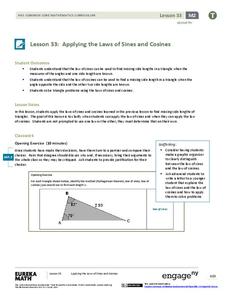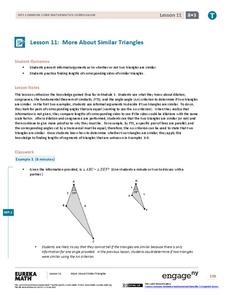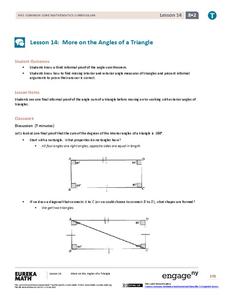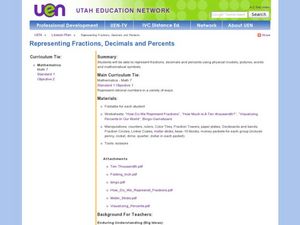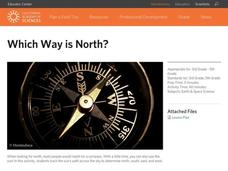Curated OER
Measuring Work
Students explore what work is, measure work done in moving an object, and tell how energy is related to work in both machines and the human body. In this measuring work lesson plan, students walk up a flight of stairs, measure the height...
Curated OER
Measure Twice
Students measure a variety of objects using the appropriate measuring tool. In this measurement lesson, students explain the importance of accuracy and precision in collecting data. They discuss the difference between the two.
Curated OER
Metric Me!
Students experience measuring things without the system of inches or millimeters. They utilize a ruler to measure or a body part to measure at least three body parts such as your ear height, finger length of foot width. Students...
EngageNY
Special Lines in Triangles (part 2)
Medians, midsegments, altitudes, oh my! Pupils study the properties of the median of a triangle, initially examining a proof utilizing midsegments to determine the length ratio of a median. They then use the information to find missing...
Curated OER
Shot Put Arc
Students complete Part A: Dissecting a Circle. They generate their own chords within the circle. Students measure the various parts of the arc in the shot put pit. The first two measurements, the chord and distance from the midpoint of...
EngageNY
Sequencing Rotations
Discover the result of a sequence of rotations about different centers. Pupils perform rotations to examine the patterns. They also describe the sequence of rotations that performed to reach a desired result in the ninth installment in a...
EngageNY
Applying the Laws of Sines and Cosines
Breaking the law in math doesn't get you jail time, but it does get you a wrong answer! After developing the Law of Sines and Cosines in lesson 33 of 36, the resource asks learners to apply the laws to different situations. Pupils must...
EngageNY
Similarity and the Angle Bisector Theorem
Identifying and verifying reproducible patterns in mathematics is an essential skill. Mathematicians identify the relationship of sides when an angle is bisected in a triangle. Once the pupils determine the relationship, they prove it to...
Curated OER
A Mass of Pennies
Learners estimate and determine the number of cents (pennies) that are needed to equal the mass of a variety of common objects. They develop a process for measuring and explore concepts related to units of measurement.
Shodor Education Foundation
Triangle Area
While the lesson plan focuses on right triangles, this activity offers a great way to practice the area of all triangles through an interactive webpage. The activity begins with the class taking a square paper and cutting in in half; can...
EngageNY
Converse of the Pythagorean Theorem
Discover a new application of the Pythagorean Theorem. Learners prove and apply the converse of the Pythagorean Theorem in the 17th lesson in a 25-part series. The examples ask learners to verify right triangles using the converse...
EngageNY
Sine and Cosine of Complementary Angles and Special Angles
Building trigonometric basics here will last a mathematical lifetime. Learners expand on the previous lesson in a 36-part series by examining relationships between the sine and cosine of complementary angles. They also review the...
EngageNY
More About Similar Triangles
Determine whether two triangles are similar. The lesson presents opportunities for pupils to find the criterion needed to show that two triangles are similar. Scholars use the definition of similarity to find any missing side...
Civil War Trust
Map the Civil War
Mapmaking was a very important element in successfully planning attacks on enemies during the Civil War. Guide pupils through the process of pacing to find the average length of their steps, measure the distance between one object...
Teach Engineering
The Amazing Red Planet
Introduce your class to Mars with a resource that provides information about its size, location, length of day, length of year, number of moons, and average temperature. Also includes is information about the lans for past...
EngageNY
Proving the Area of a Disk
Using a similar process from the first lesson in the series of finding area approximations, a measurement resource develops the proof of the area of a circle. The problem set contains a derivation of the proof of the circumference...
EngageNY
Law of Cosines
Build upon the Pythagorean Theorem with the Law of Cosines. The 10th part of a 16-part series introduces the Law of Cosines. Class members use the the geometric representation of the Pythagorean Theorem to develop a proof of the Law of...
EngageNY
More on the Angles of a Triangle
Angles and triangles: they're all connected. Uncover the connections between angles in triangles. Scholars learn how to find both exterior and interior angle measures in triangles. The instructional activity emphasizes the vocabulary...
EngageNY
Cones and Spheres
Explore methods for finding the volume of different three-dimensional figures. The 20th lesson plan in the 25-part series asks learners to interpret diagrams of 3-D figures and use formulas to determine volume. Scholars must use the...
EngageNY
Truncated Cones
Learners examine objects and find their volumes using geometric formulas in the 21st installment of this 25-part module. Objects take the shape of truncated cones and pyramids, and individuals apply concepts of similar triangles to find...
Curated OER
Representing Fractions, Decimals, and Percents
In this fractions, decimals, and percents lessons, students explore various methods of representing fractions. They demonstrate situations that represent rational numbers. Students create a foldable exploring fractions, decimals and...
K20 LEARN
Are We Golden?
Lead your class on a search for precious bones. Using a presentation, the class investigates the golden ratio in art and nature. Groups of pupils measure specific bones and find the average ratio for the class. To further cement the...
EngageNY
The Distance from a Point to a Line
What is the fastest way to get from point A to line l? A straight perpendicular line! Learners use what they have learned in the previous lessons in this series and develop a formula for finding the shortest distance from...
California Academy of Science
Which Way is North?
Who needs a compass to find cardinal directions? Just place a stick in the ground and record the movement of its shadow over the course of a day. Then, measure the shadow lengths in order to determine a north-south line. A simple...






